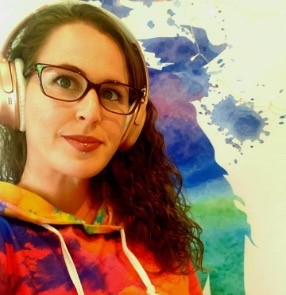Interview by Kathleen Cherrington

Stephanie, you are the co-founder of the Ontario Digital Literacy and Access Network (ODLAN). ODLAN is a non-profit that aims to remove digital literacy and access barriers. Can you share the story behind the inception of your organization and its mission to address digital divides in 2SLGBTQIA+ communities? What inspired you to create this resource directory, advocacy and support services?
My doctoral research is called “Queering the Digital Divide: Contextualizing 2SLGBTQ+ Older Adults’ Experiences with Accessing Remote Service Provisions in Ontario.” During the stay-at-home mandates in Ontario during the pandemic, I turned this research into ODLAN, an action-based initiative.
ODLAN began as a community-based pilot project to address the immediate technological needs of 2SLGBTQIA+ older adults during the pandemic. Our team is made up of academics, researchers, educators, and community leaders who are passionate about this issue. We developed a resource directory and offer educational materials, webinars, and training for organizations that need support with building their capacity to run online programming.
The directory connects 2SLGBTQIA+ older adults with tech-focused organizations and services whose mandate is to support digital literacy and device lending. In our outreach plan, we met with tech-focused organizations to identify if they were queer-friendly, and we offered them support and resources to assist them in better serving 2SLGBTQIA+ older adults.
"We cannot stop hate from happening. But we can minimize online risks, like exposure to homophobia, heterosexism, and transphobia."
Stephanie Jonsson

She examines the challenges 2SLGBTQ+ older adults experience with accessing online service provisions during the global pandemic. Beyond her academic work, Stephanie is the co-founder of the Ontario Digital Literacy and Access Network (ODLAN). ODLAN is a non-profit that aims to remove digital literacy and access barriers.
Stephanie works with organizations that serve 2SLGBTQIA+ communities to build the infrastructure and capacity to create 2SLGBTQIA+ inclusive online resources and programming. By promoting digital security, equity, and access, our mandate is to create more inclusive virtual spaces accessible to everyone.
Digital literacy and access both reflect and reproduce social inequalities. How has your organization specifically tailored its services and resources to meet the unique needs of 2SLGBTQIA+ communities? Can you provide examples of initiatives or partnerships that have had a significant impact in bridging these digital divides?
The digital divide is defined as those who have access to the internet and those that do not (Mossberger et al., 2007). Many 2SLGBTQIA+ communities face digital divide barriers. Many low-income community members face challenges because they cannot afford new devices, although these are necessary to meaningfully participate in online spaces. Environmental barriers impact 2SLGBTQIA+ people from participating in online spaces. Access is important. But we need to be careful to ensure that participating in programmes for queer or trans people does not put 2SLGBTQIA+ people at risk. If they access these programmes in communal or public spaces, they can be outed to non-affirming families, roommates, caregivers, and others.
We cannot stop hate from happening. But at ODLAN we seek to minimize online risks, like exposure to homophobia, heterosexism, and transphobia. We do this by working with organizations to enhance their digital safety strategies. We tailor our educational materials to organizational leaders who provide direct service provisions to 2SLGBTQIA+ communities, so that they can be knowledgeable and prepared to address the digital divide—and so that they are aware of the unique risks that 2SLGBTQIA+ people face.
Over time, what success stories have emerged from your organization's efforts? Can you share a specific instance where your directory or services made a substantial difference in the lives of individuals within 2SLGBTQIA+ communities, especially around digital empowerment and inclusion?
In the Fall 2021, ODLAN partnered with Connected Canadians to support 2SLGBTQIA+ older adults to help them access online service provisions. Connected Canadians is an organization that offers older adults free digital mentorship support. Through their Seniors Can Connect program, ODLAN received and delivered iPads to 2SLGBTQIA+ older adults in Toronto. Each iPad was equipped with three months of data, and recipients were partnered with digital mentors to learn about their new devices. This was an opportunity to digitally empower 2SLGBTQIA+ older adults with accessing the online world. Currently, ODLAN offers educational resources, like webinars, workshops, training, and educational materials to prepare 2SLGBTQIA+ organizations for the evolving technological needs of the communities they serve.
Is there anything else you would like people to know about the 2SLGBTQIA+ community, and how older community members are becoming more digitally literate?
We are living in a difficult moment. There is a rise in hate towards 2SLGBTQIA+ people. This is negatively impacting queer and trans people in both online and offline spaces. To support 2SLGBTQIA+ community members, ODLAN partnered with Wisdom2Action, an anti-oppression organization. We produced our report, which concluded in August 2023, “The Internet Isn’t All Rainbow: Exposing and Mitigating Online Queerphobic Hate Against 2SLBTQ+ Organizations.” This research helped us to understand 2SLGBTQIA+ professional experiences with cyberviolence and help them respond effectively. We learned how to make recommendations for how 2SLGBTQIA+ organizations in Canada can develop digital safety plans.
Kathleen Cherrington (she/her) is a doctoral student in the Gender, Feminist, and Women’s Studies program at York University. Her research focuses on sexual technologies, feminist sex-tech theories, critical trafficking and sex work studies, feminized labour, gendered poverty, urban sexualities, and sexual rights.
Works Cited:
Connected Canadians. (n.d.). https://www.connectedcanadians.ca/
Jonsson, S., Tesolin, A., Verhaeghe, A., Dietzel, C., Al Ameri, R., & Stuebing, D. L. (2023). (rep.). The Internet Isn’t All Rainbows: Exposing and Mitigating Online Queerphobic Hate against 2SLGBTQ+ Organizations. ODLAN. Retrieved from https://odlan.ca/research-report-2023/.
Mossberger, K., Tolbert, C. J., & McNeal, R. S. (2007). Digital Citizenship: The internet, society, and participation. MIT Press.
Ontario Digital Literacy and Access Network. ODLAN. (2023, March 31). https://odlan.ca/
Anti-oppression, Community Engagement, & evidence-based practice. Wisdom2Action. (n.d.).
https://www.wisdom2action.org/
